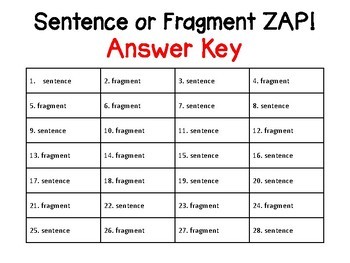


In the case of commands, the subject need not be written because “you” is understood: Go home! means You go home! And exclamations clearly express excitement, alarm, anger, or the like with no need for either a subject or a verb: Wow! Gadzooks! Ouch! In everyday speech we routinely use phrases or clauses that would not make a complete sentence-so-called sentence fragments -because the conversation or the circumstances make the meaning clear. Even though it has a subject and a verb, it needs to be connected to something in order to complete the assertion: After he kicked the ball, he fell down or He fell down after he kicked the ball. After he kicked the ball is not a sentence instead it is a dependent clause ( see subordinate clause ). In general, assertions and questions-the overwhelming majority of sentences-require a subject and a verb, put together in a way that can stand alone, resulting in what is called an independent clause ( see main clause ): He kicked the ball is a sentence.

It communicates a complete thought-an assertion, question, command, or exclamation. A sentence is the largest grammatical unit in language.


 0 kommentar(er)
0 kommentar(er)
